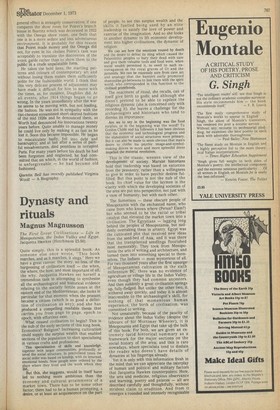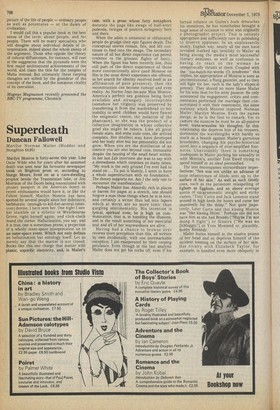Dynasty and rituals
Magnus Magnusson
The First Great Civilisations — Life in Mesopotamia, the Indus Valley and Egypt. Jacquetta Hawkes (Hutchinson £5.50).
Quite simply, this is a splendid book. As someone else once wrote, "This book marches, and as it marches, it sings." Here we have a great canvas: the story, no less, of the burgeoning of civilisation itself — the when, the where, the how, and most important of all, the why. Jacquetta Hawkes set herself a tremendous task in attempting to synthesise all the archaeological and historical evidence relating to the socially fertile zones at the .eastern end of the Mediterranean; she looks in particular for that moment when the peasant became a citizen (which is as good a definition of civilisation as any); and she has produced a compelling readable thesis that carries you from page to page, epoch to epoch, with effortless ease.
What caused civilisation to begin? This is the nub of the early sections of this long book. Economics? Religion? Increasing cultivation could supply the surplus wealth that enabled .sections of the population to start specialising in various crafts and professions:
This Specialisation of skills and 'knowledge, together with larger communities, profoundly altered the social structure. In precivilised times the social order was based on kinship, with its inturned, emotional bonds. Now people were ordered by the place where they lived and the work which they But this, she suggests, would in itself have led to nothing more ambitious than the economy and cultural attainments of a market town. There has to be some other 'factor; there had to be a human prompting, a desire, or at least an acquiescence on the part of people, to see this surplus wealth and the skills it fuelled being used by an elite leadership to satisfy the love of power and exercise of the imagination. And so she looks to another dynamic to lift economic development into higher civilisations, the dynamic of religion:
We can see how the emotions roused by death and the desire to defeat its sting which caused the Palaeolithic peoples to bury their dead with care and give them valuable tools and food were, when • social wealth permitted it, to swell to such extravagances as the royal graves of Ur and the pyramids. We can be reasonaly sure from cave art and analogy that the hunters early promoted shamanlike go-betweens to link them with the spirit world, who corresponded in this function to the civilised priesthoods.
The enactment of ritual, she recalls, can of itself give birth to gods; and although she doesn't pretend to be able to explain the religious dynamic (she is concerned only with recording it), she leaves a challenge for the archaeologists and historians who tend to dismiss its importance: Are we to say in the beginning was the 'food surplus, or in the beginning was the word? To Gordon ChiIde and his followers it has been obvious that the economic and technological progress and the elaboration of social structures were primary. But it can also be made to seem obvious that man's desire to clothe his psychic image-and-symbolmaking drives in more and more splendid dress impelled the material revolution.
This is the classic, western view of the development of society. Marxist historians hold that leadership was based on extortion from the peasantry, rather than a willingness to give in order to have psychic desires fulfilled. But this point is not the nub of the book. Its chief value for the laymen is the -clarity with which the developing societies of the area are put into perspective, not just with a view of humanity, but with each other.
The Sumerians — these obscure people of Mesopotamia with the enchanted name, who came from who knows where (Persia? Elam?) but who seemed to be the racial or tribal catalyst that elevated the market town into a civilisation. The Egyptians — lagging long behind the peoples of Mesopotamia, but suddenly overtaking them in artistry. Egypt was the cultivated plot that received new ideas from the seed-bed of Asia, and it was there that the transplanted seedlings flourished most memorably. They took from Mesopotamia the arts of writing and architecture, and turned them into something special to themselves. The Indians — most mysterious of all. For two thousand years after the first upsurge• of Mesopotamian cultivation in the sixth millennium BC, there was no evidence of agriculture or village life in the Indus Valley, even though they had commbn ancestors. And then suddenly a great civilisation springs up, fully-fledged. But unlike the other two, it withered away quickly, and today it is almost inaccessible to the archaeologist's skill, for nothing of that momentous human experience, the birth of civilisation, was committed to writing.
Not unnaturally, because of the paucity of evidence about the Indus Valley (despite the labours of Sir Mortimer Wheeler), it is Mesopotamia and Egypt that take uP the bulk of this book. For both, we are given an ex
tremely lucid historical summary as a framework for the major sections on the
social history of the area; and this is rare nowadays, where specialists tend to disdain the reader who doesn't have details of dynasties at his fingertips already. Yet it is only with this information fresh in the mind that we can appreciate the interplay of human and political and military factors that Jacquetta Hawkes counterpoints. Here, the arts and medicine, religious observance and learning, poetry and palaces — all are described carefully and thoughtfully, without strident claim to .erudition. And from it emerges a rounded and intensely recognisable picture of the life of people — ordinary people, as well as potentates — at the dawn of Civilisation. .
I would call this a popular book in the best sense of the term: about people, and for people. There will be many specialists who will disagree about individual details of interpretation, indeed about the whole sweep of the argument. Those who oppose the theory of cultural diffusionism, for instance, will rear at the suggestion that the pyramids were the' first major architectural achievements of the world, and claim the title for the temples of Malta instead. But ultimately these Carping thoughts are stilled by the grandeur of the concept of the book, and the luminous vitality of its execution.
Magnus Magnusson recently presented the BBC-TV programme, Chronicle











































 Previous page
Previous page